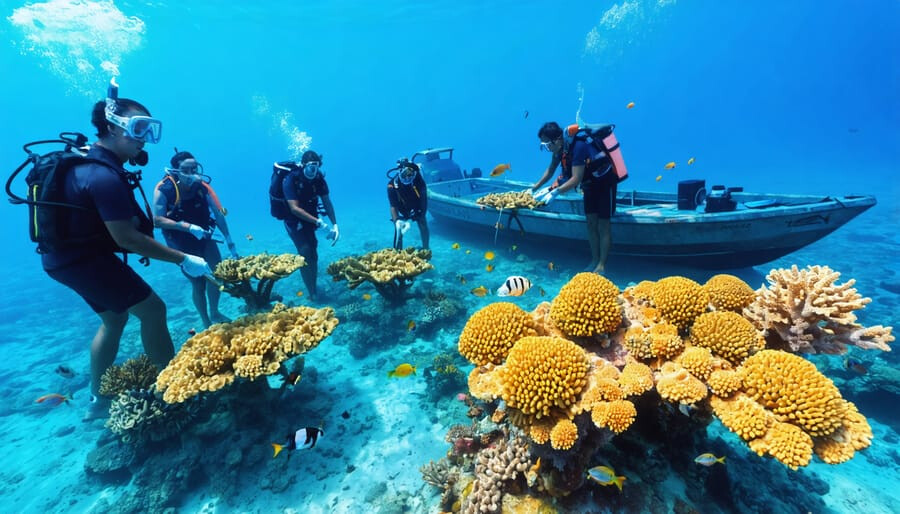
Vietnam boasts over 3,260 km of beautiful coastline from north to south, making it an attractive destination for both domestic and international tourists. The National Tourism Development Strategy until 2030 prioritizes the development of coastal and island tourism, including beach resorts, marine sports, and entertainment. Marine tourism is a vital component of local and national economic growth, accounting for 70% of the tourism sector's total revenue. However, this rapid growth has led to environmental issues, prompting coastal regions to seek sustainable solutions to preserve natural resources for future generations.
Efforts to Combat Marine Pollution for Green Tourism
The surge in tourists has exacerbated problems like plastic waste, coral reef degradation, and ecological imbalance. The Institute for Tourism Development Research (ITDR) warns that plastic waste from tourism activities could triple to 336,400 tons annually by 2030.
However, marine ecosystem restoration projects are showing positive results. In Nha Trang Bay, over 15 hectares of coral reefs have been revitalized since 2015, and the Cu Lao Cham Marine Protected Area protects more than 16,000 hectares through the collaborative efforts of local authorities, fishermen, and NGOs. This area attracts over 200,000 visitors and generates approximately $30 million in revenue annually while preserving its long-term natural value.
Initiatives like GreenHub's 'Joining Hands for A Blue Sea' have mobilized thousands of volunteers to clean beaches in Da Nang, Quang Nam, and Phu Yen provinces. These efforts are raising public environmental awareness and supporting the long-term development of sustainable marine tourism.
Community Action and Policy Support
On June 8, approximately 10,000 volunteers participated in the 'Act for a Blue Sea' campaign, launched by Vingroup's 'For Green Future Fund.' They collected 72 tons of trash from 17 hectares of beaches across 28 coastal provinces. Organizers stated that these activities help foster a culture of environmental responsibility and drive long-term behavioral changes.
Individuals are also making conscious travel choices, such as avoiding single-use plastics and preferring eco-friendly tours. Many tourists are setting good examples by not littering and involving their children in beach clean-up activities organized by local authorities or tour operators.
In response, the Vietnamese government is implementing various policies to combat plastic pollution in the tourism industry. The Ministry of Culture, Sports and Tourism has issued environmental guidelines aimed at eliminating the use of single-use plastics in tourist attractions and accommodations by 2025.
Toward a Sustainable Coastal Future
Experts emphasize that sustainable marine tourism requires collaboration among the state, businesses, and local communities. They are focusing on ecotourism, adopting eco-friendly technologies for waste management, and strengthening public education.
Vũ Thế Bình, Chairman of the Vietnam Tourism Association, urged local and tourism businesses to find alternatives to plastics in their operations. He stressed that marine conservation is not solely the responsibility of the tourism industry but a shared duty of everyone, including individuals and tourists.
Today's environmental protection efforts are aimed at safeguarding valuable resources and preserving natural beauty, ensuring that future generations can experience Vietnam's clean, blue seas.
[Copyright (c) Global Economic Times. All Rights Reserved.]




























